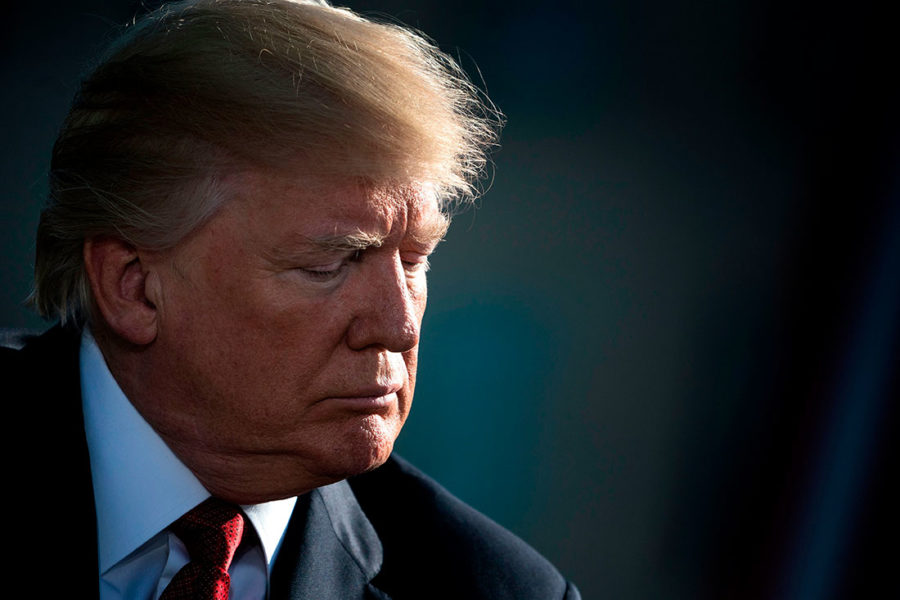Impeachment trials will proceed
A week following the insurrection against the U.S. Capitol, the U.S. House impeached then-President Donald Trump with incitement.
February 9, 2021
The United States Senate voted in favor of proceeding with former President Donald Trump’s second impeachment trial in a 56-44 vote, with six GOP senators crossing party lines in support.
At the scene of the crime, the trial began with speeches from House prosecutors. House impeachment managers stress the Senate must proceed for the sake of precedent for leaders to come and began by showing gruesome footage from Jan. 6. Trump’s defense team argued because he is a private citizen, he cannot face a trial by the Senate. Democrats and legal scholars say otherwise.
The House successfully impeached Trump prior to him leaving office with charges of “incitement of insurrection” after a violent pro-Trump mob stormed the Capitol building Jan. 6. Trump’s defense argued the Senate does not have jurisdiction over the trials.
Democrats spent much of the session proving the trials’ constitutionality, stressing the Senate has the “sole power to try all impeachments,” according to Article 1 Section 3 Clause 6 of the Constitution. Prosecutors argued most legal scholars, including conservatives, agree a former president can be tried even after leaving office.
Kelly Shaw, associate teaching professor in the political science department said Democrats are trying to make an example of Trump’s behavior while sending a signal to their base and future office holders that they won’t stand for questioning fair and free elections.
Democrats have to prove Trump crossed the line of political speech, and Shaw said that is a steep accusation to make and could backfire on Democrats in the long run.
“There is a limit in terms of political speech as it applies to the First Amendment,” Shaw said. “Although it would be political suicide to make that argument, but I think what they are trying to demonstrate is there is a limit to free speech and a limit to how far you, even as the chief executive of the United States can take some of this rhetoric.”
Republicans also argued Section 3 Clause 6 to argue Chief Justice John Roberts should preside over the trial instead of the president pro tempore, Patrick Leahy. The clause reads, “when the president of the United States is tried the Chief Justice shall preside.”
House managers argued because this only applies to a sitting president and the president pro tempore should preside over the trials just as they would for the impeachment of any public official.
House impeachment managers dually serve as witnesses to the crime. While making their case, prosecutors continually reminded the Senate of what they experienced during the insurrection.
“What you experienced that day, what we experienced that day, what our country experienced that day is the framer’s worst nightmare come to life,” said Rep. Joe Neguse, (D-CO). “Presidents can’t inflame insurrection in their final weeks and then walk away like nothing happened.”
Trump’s lawyer Bruce Castor referred to impeachment as an attack on the Constitution and asked the Senate to cease the “bitter infighting” for the sake of the republic.
During his defense, Castor spent much of his time praising the senators, referring to them as “extraordinary people,” and overall spoke very little about Trump. Castor said the 14th suggestion by the prosecution that the 14th Amendment applies is ridiculous.
“It doesn’t take a constitutional scholar to recognize that that’s written for people who fought for the confederacy or previous military officers who were in the confederacy, and it doesn’t take a constitutional scholar that they be convicted first, in a court with due process of law,” Castor said. “So that question can never be right until those things have happened.”
Defense lawyer David Schoen took a more aggressive approach, warning if proceedings follow, it would look bad for the Senate and the country.
“Our great country, a model for all the world, will be far more divided and our standing around the world will be badly broken,” Schoen said.
This is the most bipartisan impeachment in history, but that doesn’t say much. While the Senate trial appears to mirror a legal trial, Shaw said impeachment has always been a highly political process.
After almost four hours of arguments from both sides, both Iowa Senators Joni Ernst and Chuck Grassley joined their Republican colleagues to vote against the Senate’s trials. Sen. Mitch McConnell also voted against the proceeding, consistent with his previous vote against the Senate trial.
The vote today signals likelihood for Trump’s acquittal, Shaw said Democrats don’t have much to gain because Trump’s political career is
House managers waved their rebuttal and planned to address the defense presentation, including the First Amendment, due process and partisanship under the Constitution.
“Political speech is a highly protected form of speech,” Shaw said. “The argument that the constitution protects the president in terms of his freedom of speech, particularly political speech which this clearly in my mind is. That raises a huge burden of proof that falls on the Democratic side that this wasn’t protected speech.”
The trial will continue Wednesday around noon Eastern Time.
“Sadly it is an indication of polarization, when all is said and done we will still have a bad taste in our mouths,” Shaw said. “We will still be ashamed that the president acted that way and likewise maybe we will be ashamed the Democrats went after a lame-duck president who should be out of sight out of mind in that regard.”

















